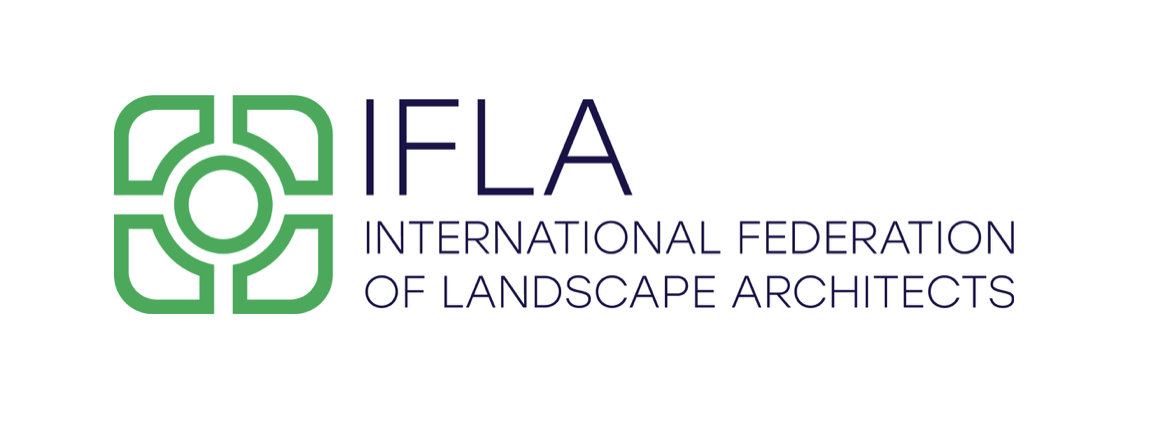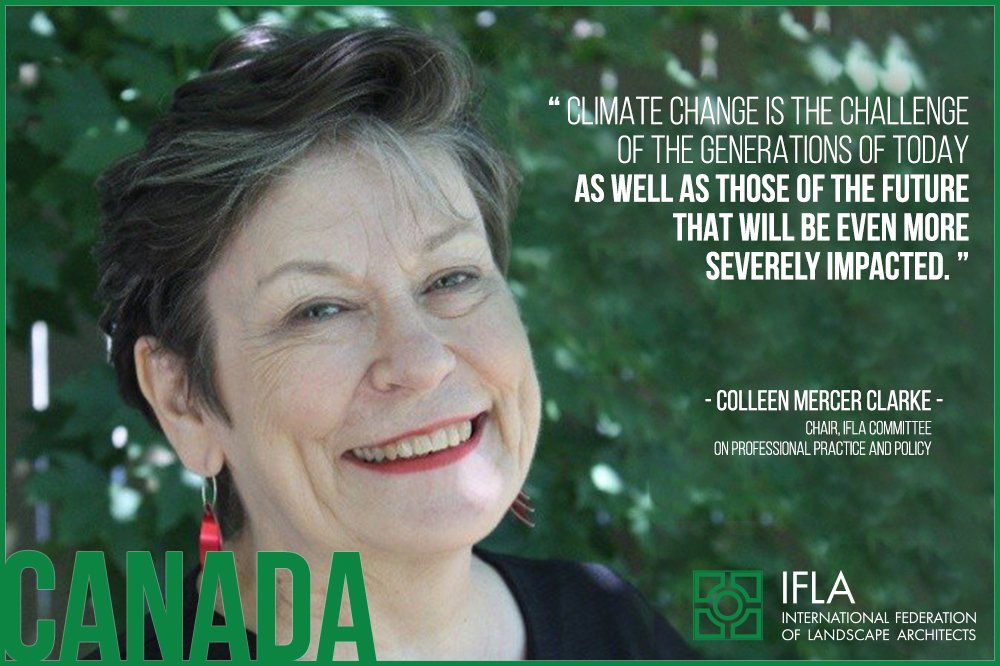Colleen Mercer-Clarke
Chair, IFLA Committee on Professional Practice and Policy
A practicing landscape architect for over thirty years, Colleen is also a coastal ecologist whose recent work has focused on adaptation options for sea level rise and severe weather effects attributed to climate change. Colleen's career has included environmental management and site design for major industry, including the restoration of contaminated sites. Her great love remains with the marine environment, and ensuring the sustainability of ecosystems worldwide.
Why women? Why climate change? Why Now?
Climate change is an every person problem. There are few places in the world that will not be altered, and few societies that will not be impacted. We are almost finished with the first quarter of 2021, and too little progress has been made towards reducing emissions, or preparing communities for the anticipated environmental change. Women throughout the world play an impressive role in leadership in landscape architecture, voluntarily offering not only their significant planning and design skills, but also their empathy and humanity. Climate change is the challenge of the generations of today as well as those of the future that will be even more severely impacted. Now, not tomorrow, is when the smallest actions will result in the greatest benefits to impact reduction and to preparing our world for its uncertain future.
What is the biggest challenge facing women leaders in male dominated field and how to overcome them?
Too often, the senior decision-makers in our community are men, many of whom are not conditioned to see women as entirely equal in positions that require significant skill and judgement. Then too, far too many women have been accepting of these circumstances and share the vision of their role always to be the respected colleague, but not the leader. Years ago, in working with minority populations, I was taught that children had to SEE themselves in a particular role in society (e.g., lawyer, architect, leader) in order to aspire to the education and training needed to attain that role in life. It is immensely important that we continue to showcase women in leadership positions so that the coming generations will aspire to those roles or to even greater responsibilities.
What are the pressing issues you are contributing as a landscape architect for tackle climate change?
Most of my work has focused first on reducing emissions - largely through alternative approaches to planning and design for human communities, and by advocating for alternative lifestyle and professional choices. My design work revolves around the challenges faced by coastal environments and communities, where climate effects include the usual issues (i.e., heat and cold extremes, cloudburst and drought), but where severe weather and continually rising sea levels place specific challenges on the occupation and use of low-lying areas. Many of the systems we rely on (e.g., potable water, wastewater treatment and disposal, shipping, food) will be impacted as conditions change, some sooner than most people anticipate.
How you approach your business/ your research as a woman who lead?
In my childhood, I was expected to do my best, and because my best included learning well - I was expected to excel and to choose a worthy career. I was raised in a working class family, with three older sisters, all of whom have had excellent careers. It is not necessary for a woman to think as a man, or to behave as a man might. Women can have their own unique approaches to problem-solving, making them invaluable in male-dominated professions. Basically, I was taught, and I believe, that when faced with gender discrimination, the problem is with the man, not with me. Mostly I have ignored people who say 'you can't', or 'you shouldn't, and just moved forward with my own attempts to be smart, creative, kind and, hopefully, inspiring to some.
What is the most frustrating moment/comment you’ve heard as a woman who leads in the profession?
Actually. The most frustrating comment for me is being described as someone who works at the 'fringe' of the profession of landscape architecture. Because of my joined skills in marine ecology and landscape architecture, my career often focused around assessment, planning, design and deconstruction/restoration of heavy industry sites. Not always an aesthetic outcome, but certainly a workable, functioning landscape. To me, protecting and sustaining nature lies at the core of our profession -not on its fringes. It is our reason for being. If we as landscape architectures cannot advance personal experiences with nature, and the ensuring increased valuation of the natural environment, we will not have served our highest and best function. At no time in the history of human civilization has there been a greater need to connect human society with the sustainability of the planet on which we depend.
What’s the most important risk you took and why?
Hmmm. At 54 years of age I left private practice and went back to school to undertake a doctorate in interdisciplinary studies. I wanted to find out if the coasts in Canada were deteriorating as was the situation in many areas of the world. And I wanted to find out WHY we were doing such a bad job of sustaining those critically important environments. While doing the doctorate, I became part of an inter-country, inter-university, inter-community team working on the sea level rise and severe weather impacts on coastal communities from the Arctic Ocean to the Caribbean Sea. This changed my professional and personal life.
They say “Gender Equality Means Business” -- what do you think about that?
Its been over fifty years since I began my university studies. During the six years of a Bachelor's and Master's program in science, I was NEVER treated unequally to my male colleagues or by my teachers. We were all treated the same - as minds to be molded, with lives to be committed to greater understanding. Please note. My MSc in Marine Biology was conducted at the edge of the cold North Atlantic ocean, and included year round SCUBA, and being included as one of the deep dive rescue team. I graduated from Memorial University in Newfoundland with no knowledge of any limitations derived from being a women - I was a SMART and capable woman. That was what was important. I wish I could say that this has been the path I have trod over the next half century but that would not be true. Society has occasionally opened doors, but have closed far more. However, I have been a manager in design firms, where the owner valued the female voice at his board table as one of the assets that made his firm more innovative and competitive. I have worked more with men and women for whom gender equality was an unstated expectation than I have worked with men for whom gender was a determination of ability. A lack of gender equality generates expectations that the individual or the company is backward not forward thinking. Lacking insight or the need to move with the times.
How your work contributes to other women?
As I noted at the beginning of the interview. Girls must see women who work. Boys must see men who work. This is true whether you are 10, 20 or 30 years old. My most inspiring mentor is now 100 years old and still active. She began inspiring me when I was 34 and she as continued to inspire me every year since. She makes what is possible real and challenges me to do the same. I want to be her for other women. Sometimes, we just need to be visible, doing important things, and having a voice that compels others to listen. Sometimes its not about the project we built or the book we wrote, it is about what we believe and how we fight for what we believe.
What advice would you give to the next generation of female design leaders?
Get the MOST out of your time in school that you can. Spend hours in the library, because you can flip through hard cover books so quickly and you will always find something that stays with you. Learn from your teachers and the people in the community you live. Accept criticism as though it was intended to help (knowing that this is not always true), and learn from it - even if what you learn is about the person who delivered it. Find people to inspire you - not always from your profession. Find something that you can be passionate about, and try to find a position that enables you to do something with that passion at least 5% of the time. It does not take a lot of time to feel fulfilled and worthy. Always understand that other people's barriers are theirs not yours. Your job is to find a way around them, through them, or to bring them along with you. Once you are good at what you do, find new things to do. Or new ways to do them. Grow.

